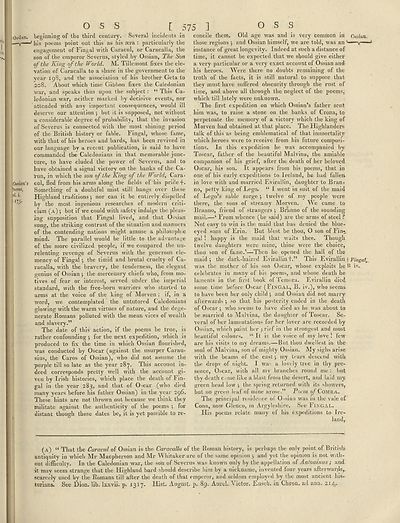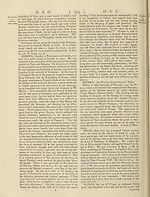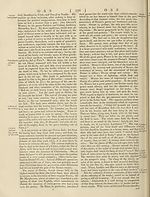Encyclopaedia Britannica > Volume 15, NIC-PAR
(651) Page 575 - OSS
Download files
Complete book:
Individual page:
Thumbnail gallery: Grid view | List view

OSS [ 575 ] OSS
lOssian. beginning of the third century. Several incidents in
—y—his poems point out this as his sera : particularly the
engagement of Fingal with Caracul, or Caracalla, the
son of the emperor Severus, styled by Ossian, The Son
of the King of the World. M. Tillemont fixes the ele¬
vation of Caracalla to a share in the government to the
year 198, and the association of his brother Geta to
208. About which time Gibbon fixes the Caledonian
war, and speaks thus upon the subject : “ This Ca¬
ledonian war, neither marked by decisive events, nor
attended with any important consequences, would ill
deserve our attention ; but it is supposed, not without
a considerable degree of probability, that the invasion
of Severus is connected with the most shining period
of the British history or fable. Fingal, whose fame,
with that of his heroes and bards, has been revived in
our language by a recent publication, is said to have
commanded the Caledonians in that memorable junc¬
ture, to have eluded the power of Severus, and to
have obtained a signal victory on the banks of the Ca~
run, in which the son of the King of the World, Cara*
Osmris cul, fled from his arms along the fields of his pride f.
'oms, Something of a doubtful mist still hangs over these
Highland traditions-, nor can it be entirely dispelled
by the most ingenious researches of modern criti¬
cism (a) ; but if we could with safety indulge the pleas¬
ing supposition that Fingal lived, and that Ossian
sung, the striking contrast of the situation and manners
of the contending nations might amuse a philosoph c
mind. The parallel would be little to the advantage
of the more civilized people, if we compared the un¬
relenting revenge of Severus with the generous cle¬
mency of Fingalthe timid and brutal cruelty of Ca¬
racalla, with the bravery, the tenderness, the elegant
genius of Ossian j the mercenary chiefs who, from mo¬
tives of fear or interest, served under the imperial
standard, with the free-born warriors who started to
arms at the voice of the king of Morven : if, in a
word, we contemplated the untutored Caledonians
glowing with the warm virtues of nature, and the dege¬
nerate Romans polluted with the mean vices of wealth
and slavery.”
The date of this action, if the poems be true, is
rather confounding } for the next expedition, which is
produced to fix the time in which Ossian flourished,
was conducted by Oscar (against the usurper Carau-
sius, the Caros of Ossian), who did not assume the
purple till so late as the year 287. This account in¬
deed corresponds pretty well with the account gi¬
ven by Irish histories, which place the death of Fin¬
gal in the year 283, and that of O-car (who died
many years before his father Ossian) in the year 296.
These hints are not thrown out because we think they
militate against the authenticity of the poems 5 for
distant though these dates be, it is yet possible to re¬
concile them. Old age was and is very common in ossia&.
those regions ; and Ossian himself, we are told, was an —v-—
instance of great longevity. Indeed at such a distance of
time, it cannot be expected that we should give either
a very particular or a very exact account of Ossian and
his heroes. Were there no doubts remaining of the
truth of the facts, it is still natural to suppose that
they must have suft'ered obscurity through the rust of
time, and above all through the neglect of the poems,
which till lately were unknown.
The first expedition on which Ossian’s father sent
him was, to raise a stone on the banks of Crona, to
perpetuate the memory of a victory which the king of
M orven had obtained at that place. The Highlanders
talk of this as being emblematical of that immortality
which heroes were to receive from his future composi¬
tions. In this expedition he was accompanied by
Toscar, father of the beautiful Malvina, the amiable
companion of his grief, after the death of her beloved
Oscar, his son. It appears from his poems, that in
one of his early expeditions to Ireland, he had fallen
in love with and married Evirallin, daughter to Bran-,
no, petty king of Lego. “ I went in suit of the maid
of Lego’s sable surge ; twelve of my people were
there, the sons of streamy Morven. We came to
Branno, friend of strangers -, Branno of the sounding
mail.—‘ From whence (he said) are the arms of steel ?
Not easy to win is the maid that has denied the blue¬
eyed sons of Erin. But blest be thou, O son of Fin¬
gal ! happy is the maid that waits thee. Though
twelve daughters were mine, thine were the choice,
thou son of fame.’—Then he opened the hall of the
maid j the dark-haired Evirallin t.” This Evirallin f Fingal*
was the mother of his son Oscar, whose exploits he It iv.
celebrates in many of his poems, and whose death he
laments in the first book of femora. Evirallin died
some time before 0>car (Fingal, B. iv.), who seems
to have been her only child ; and Ossian did not marry
afterwards -, so that his po-terity ended in the death
of Oscar who seems to have died as he was about to
be married to Malvina, the daughter of Toscar. Se¬
veral of her lamentations for her lover are recorded by
Ossian, which paint her j;rief in the strongest and most
beautiful colours. “ It is the voice of my love! few
are his visits to my dreams.— But thou dwellest in the
soul of Malvina, son of mighty Ossian. My sighs arise
with the beams of the east} my tears descend with
the drops of night. I wa a lovely tree in thy pre¬
sence, Oscar, with all mv branches round me : but
thy death c me like a blast from the desert, and laid my
green head low ; the spring returned with its showers,
but no green leaf of mine arose.” Poem oj Comra.
The principal residence of 0>sian was in the vale of
Cona, now Gler.co, m Argyleslure. See Fingal.
His poems relate many of his expeditions to Ire¬
land,
(a) “ That the Caracul of Ossian is the Caracalla of the Roman history, is perhaps the only point of British
antiquity in which Mr Macpherson and Mr Whitaker are of the same opinion j and yet the opinion is not with¬
out difficulty. In the Caledonian war, the son of Severus was known only by the appellation of Antoninus; and
It may seem strange that the Highland bard should describe him by a nickname, invented four years afterwards,,
scarcely used by the Romans till after the death of that emperor, and seldom employed by the most ancient his¬
torians. See 13ion. lib. Ixxvii. p. I3I7’ Hist. August, p. 89. Aurel. Victor, Euseb. in Cliron. ad ann. Z14.
lOssian. beginning of the third century. Several incidents in
—y—his poems point out this as his sera : particularly the
engagement of Fingal with Caracul, or Caracalla, the
son of the emperor Severus, styled by Ossian, The Son
of the King of the World. M. Tillemont fixes the ele¬
vation of Caracalla to a share in the government to the
year 198, and the association of his brother Geta to
208. About which time Gibbon fixes the Caledonian
war, and speaks thus upon the subject : “ This Ca¬
ledonian war, neither marked by decisive events, nor
attended with any important consequences, would ill
deserve our attention ; but it is supposed, not without
a considerable degree of probability, that the invasion
of Severus is connected with the most shining period
of the British history or fable. Fingal, whose fame,
with that of his heroes and bards, has been revived in
our language by a recent publication, is said to have
commanded the Caledonians in that memorable junc¬
ture, to have eluded the power of Severus, and to
have obtained a signal victory on the banks of the Ca~
run, in which the son of the King of the World, Cara*
Osmris cul, fled from his arms along the fields of his pride f.
'oms, Something of a doubtful mist still hangs over these
Highland traditions-, nor can it be entirely dispelled
by the most ingenious researches of modern criti¬
cism (a) ; but if we could with safety indulge the pleas¬
ing supposition that Fingal lived, and that Ossian
sung, the striking contrast of the situation and manners
of the contending nations might amuse a philosoph c
mind. The parallel would be little to the advantage
of the more civilized people, if we compared the un¬
relenting revenge of Severus with the generous cle¬
mency of Fingalthe timid and brutal cruelty of Ca¬
racalla, with the bravery, the tenderness, the elegant
genius of Ossian j the mercenary chiefs who, from mo¬
tives of fear or interest, served under the imperial
standard, with the free-born warriors who started to
arms at the voice of the king of Morven : if, in a
word, we contemplated the untutored Caledonians
glowing with the warm virtues of nature, and the dege¬
nerate Romans polluted with the mean vices of wealth
and slavery.”
The date of this action, if the poems be true, is
rather confounding } for the next expedition, which is
produced to fix the time in which Ossian flourished,
was conducted by Oscar (against the usurper Carau-
sius, the Caros of Ossian), who did not assume the
purple till so late as the year 287. This account in¬
deed corresponds pretty well with the account gi¬
ven by Irish histories, which place the death of Fin¬
gal in the year 283, and that of O-car (who died
many years before his father Ossian) in the year 296.
These hints are not thrown out because we think they
militate against the authenticity of the poems 5 for
distant though these dates be, it is yet possible to re¬
concile them. Old age was and is very common in ossia&.
those regions ; and Ossian himself, we are told, was an —v-—
instance of great longevity. Indeed at such a distance of
time, it cannot be expected that we should give either
a very particular or a very exact account of Ossian and
his heroes. Were there no doubts remaining of the
truth of the facts, it is still natural to suppose that
they must have suft'ered obscurity through the rust of
time, and above all through the neglect of the poems,
which till lately were unknown.
The first expedition on which Ossian’s father sent
him was, to raise a stone on the banks of Crona, to
perpetuate the memory of a victory which the king of
M orven had obtained at that place. The Highlanders
talk of this as being emblematical of that immortality
which heroes were to receive from his future composi¬
tions. In this expedition he was accompanied by
Toscar, father of the beautiful Malvina, the amiable
companion of his grief, after the death of her beloved
Oscar, his son. It appears from his poems, that in
one of his early expeditions to Ireland, he had fallen
in love with and married Evirallin, daughter to Bran-,
no, petty king of Lego. “ I went in suit of the maid
of Lego’s sable surge ; twelve of my people were
there, the sons of streamy Morven. We came to
Branno, friend of strangers -, Branno of the sounding
mail.—‘ From whence (he said) are the arms of steel ?
Not easy to win is the maid that has denied the blue¬
eyed sons of Erin. But blest be thou, O son of Fin¬
gal ! happy is the maid that waits thee. Though
twelve daughters were mine, thine were the choice,
thou son of fame.’—Then he opened the hall of the
maid j the dark-haired Evirallin t.” This Evirallin f Fingal*
was the mother of his son Oscar, whose exploits he It iv.
celebrates in many of his poems, and whose death he
laments in the first book of femora. Evirallin died
some time before 0>car (Fingal, B. iv.), who seems
to have been her only child ; and Ossian did not marry
afterwards -, so that his po-terity ended in the death
of Oscar who seems to have died as he was about to
be married to Malvina, the daughter of Toscar. Se¬
veral of her lamentations for her lover are recorded by
Ossian, which paint her j;rief in the strongest and most
beautiful colours. “ It is the voice of my love! few
are his visits to my dreams.— But thou dwellest in the
soul of Malvina, son of mighty Ossian. My sighs arise
with the beams of the east} my tears descend with
the drops of night. I wa a lovely tree in thy pre¬
sence, Oscar, with all mv branches round me : but
thy death c me like a blast from the desert, and laid my
green head low ; the spring returned with its showers,
but no green leaf of mine arose.” Poem oj Comra.
The principal residence of 0>sian was in the vale of
Cona, now Gler.co, m Argyleslure. See Fingal.
His poems relate many of his expeditions to Ire¬
land,
(a) “ That the Caracul of Ossian is the Caracalla of the Roman history, is perhaps the only point of British
antiquity in which Mr Macpherson and Mr Whitaker are of the same opinion j and yet the opinion is not with¬
out difficulty. In the Caledonian war, the son of Severus was known only by the appellation of Antoninus; and
It may seem strange that the Highland bard should describe him by a nickname, invented four years afterwards,,
scarcely used by the Romans till after the death of that emperor, and seldom employed by the most ancient his¬
torians. See 13ion. lib. Ixxvii. p. I3I7’ Hist. August, p. 89. Aurel. Victor, Euseb. in Cliron. ad ann. Z14.
Set display mode to:
![]() Universal Viewer |
Universal Viewer | ![]() Mirador |
Large image | Transcription
Mirador |
Large image | Transcription
Images and transcriptions on this page, including medium image downloads, may be used under the Creative Commons Attribution 4.0 International Licence unless otherwise stated. ![]()
| Encyclopaedia Britannica > Encyclopaedia Britannica > Volume 15, NIC-PAR > (651) Page 575 - OSS |
|---|
| Permanent URL | https://digital.nls.uk/192590161 |
|---|
| Attribution and copyright: |
|
|---|
| Shelfmark | EB.11 |
|---|---|
| Description | Ten editions of 'Encyclopaedia Britannica', issued from 1768-1903, in 231 volumes. Originally issued in 100 weekly parts (3 volumes) between 1768 and 1771 by publishers: Colin Macfarquhar and Andrew Bell (Edinburgh); editor: William Smellie: engraver: Andrew Bell. Expanded editions in the 19th century featured more volumes and contributions from leading experts in their fields. Managed and published in Edinburgh up to the 9th edition (25 volumes, from 1875-1889); the 10th edition (1902-1903) re-issued the 9th edition, with 11 supplementary volumes. |
|---|---|
| Additional NLS resources: |
|

